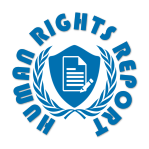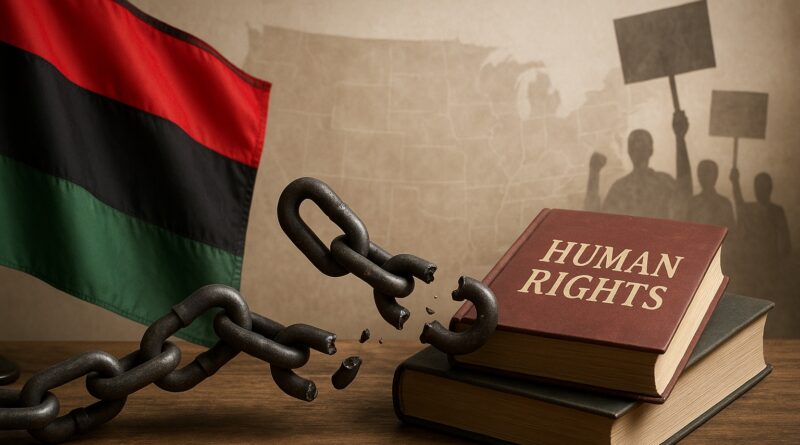The Unfulfilled Promise: Why Remedial Secession Deserves Reconsideration for Descendants of Chattel Slavery in the U.S.
By Tamara “Achoti” Singleton
The concept of self-determination is a cornerstone of modern international law, yet its application has historically been uneven, particularly for descendants of chattel slavery in the United States. While the prevailing legal frameworks currently do not support a unilateral right to secession for a sub-state group, the profound historical injustices and ongoing systemic oppression faced by this community compel a critical re-examination of “remedial secession” not as a legal myth, but as a moral imperative.
A Legacy of Denied Nationhood and Eroding Rights
For centuries, descendants of chattel slavery have endured a unique form of internal subjugation that, while distinct from traditional colonialism, shares its characteristics of “alien subjugation, domination, and exploitation”. They were never given the right to hold a plebiscite vote to determine their nationhood or allegiance, a fundamental denial of collective political agency. Born into a system that explicitly denied them citizenship and basic human dignity, as affirmed by the infamous Dred Scott v. Sandford ruling, their struggle for self-determination is not merely a historical grievance but a response to a perceived ongoing denial of fundamental rights.
Following the formal abolition of slavery, new legal structures emerged, such as Black Codes and Jim Crow laws, which were meticulously designed to control newly freed African Americans. These laws perpetuated economic dependence through mechanisms like convict leasing, restricted mobility, and maintained a rigid racial hierarchy, fundamentally undermining any notion of self-determination.
A critical distinction arises between human rights and civil rights, a point often emphasized by proponents of self-determination for this group. While human rights are inherent and universal, civil rights are contextual, granted by a specific government to its citizens, and thus susceptible to legislative or judicial limitation or removal. The historical narrative demonstrates that even when civil rights were formally granted, systemic racism often undermined their full enjoyment. Contemporary concerns regarding voter suppression, restrictions on anti-discrimination efforts, and disproportionate policing suggest that civil rights are indeed being weakened or “removed from laws,” highlighting a persistent disparity between the promise of civil rights and the full realization of human rights. This continuous erosion suggests that civil rights alone are insufficient to address the deep-seated systemic racial injustice.
The Unequal Application of Self-Determination
The question then arises: if other groups, such as the Jewish people in 1948, were granted the right to self-determination, why not descendants of chattel slavery? The establishment of the State of Israel in 1948, following the British Mandate for Palestine and the Holocaust, was a unique instance of external self-determination within the framework of decolonization. However, critics argue that the UN’s partition of land in Palestine, without the direct consent of the majority Arab population, effectively constituted a form of colonization, superseding the self-determination of existing inhabitants. This historical event underscores the inherent tension between the principle of self-determination and the principle of territorial integrity, where political considerations and state interests often heavily influence the application of international law.
This disparity highlights a profound frustration: the international legal system, primarily made by states concerned with their own stability, prioritizes territorial integrity over the will of a people who have suffered immense, prolonged human rights violations and are denied genuine internal self-determination. While the doctrine of remedial secession posits a qualified right to secession in instances of gross and systematic human rights violations, it remains highly contested and is “widely considered a ‘legal myth'”. This suggests a critical paradox: a doctrine supposedly offering a “remedy” functions more as an admission of systemic failure and a reluctance to fully apply human rights and international legal rules in extreme situations.
For descendants of chattel slavery, the argument is compelling: they have “exhausted all remedies afforded to them by the State of America”. When domestic remedies are unavailable, ineffective, or unreasonably delayed, international human rights discourse recognizes a “right to resist” oppression. The preamble to the Universal Declaration of Human Rights states that human rights protection by the rule of law is essential “if man is not to be compelled to have recourse, as a last resort, to rebellion against tyranny and oppression”. This position suggests that for a people facing a “broken” system with “no real avenue of redress,” continued subjugation becomes an inhumane choice, lending weight to the argument for separation.
The Economic Equation and the Path Forward
The United States, critics contend, was “built by the hands of the ancestors of the descendants of chattel slavery,” and its global power, including its influence in the UN, is fundamentally linked to the wealth obtained from this exploitation. The economic contribution of Black Americans remains substantial, with Black consumer buying power projected to reach approximately $1.98 trillion by 2025. Black-owned businesses added $212 billion in revenue to the economy in 2022, employing 1.6 million people. This undeniable and vital economic influence raises the question of whether resistance to Black secession is partly rooted in the potential for profound disruption to the U.S. economy.
While the economic implications of secession are generally viewed as highly disruptive and costly for both the seceding entity and the parent state, potentially exacerbating humanitarian concerns, the alternative of perpetual subjugation is presented as unconscionable. The pursuit of justice for descendants of chattel slavery, encompassing comprehensive reparations and true self-determination, remains paramount.
Given the severe and enduring injustices, the argument for remedial secession, despite its significant legal and practical hurdles, stands as a profound call for a pathway to justice that has been historically denied. When a system is perceived as fundamentally broken and alternative avenues of redress appear exhausted, the “last resort” of defining one’s own political destiny, even if it entails separation, becomes a compelling moral consideration for a people seeking nothing less than full human dignity and liberation. The question is not merely whether international law currently supports it, but whether it should in cases of such extreme and persistent oppression.





